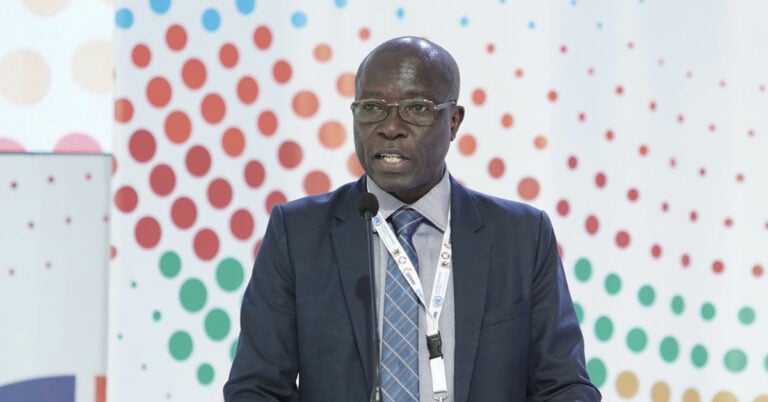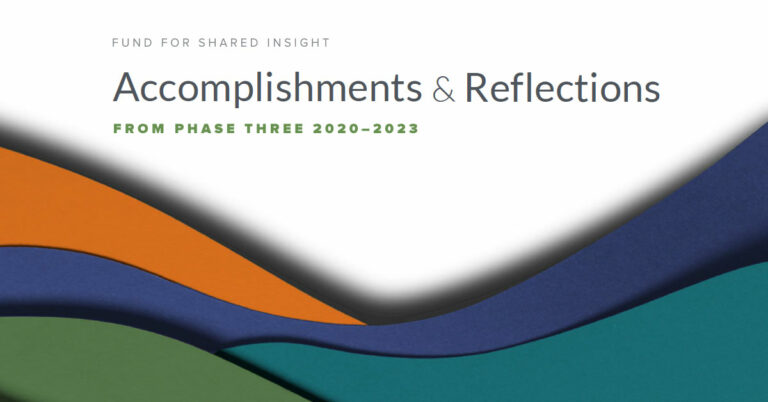As core funders of Fund for Shared Insight, we believe that helping funders listen, respond, and shift decision making to people and communities most impacted but least consulted by our sector is one of the most effective ways to improve philanthropy and increase equity. While our work has centered mostly on domestic efforts, we have always been interested in supporting listening well in international contexts.
When we stepped into the role of co-chairs of Shared Insight’s international committee three years ago, we took up a journey to understand how funders who work globally can support the kind of listening that centers communities and advances equity, while taking into consideration the nuanced contexts in which they work. This effort aligns with our values and focus at the Partnerships team at the Conrad N. Hilton Foundation. The team oversees a cross-cutting grantmaking portfolio where we aim to bring the voices and experiences of grassroots organizations and people with lived expertise to the decision-making tables. We also bring experience from the Hilton Foundation’s grantmaking around the world to our work at Shared Insight.
Shared Insight’s early international efforts included a variety of pilot projects in partnership with Feedback Labs, Innovations for Poverty Action, and Listen4Good. We also commissioned landscape reviews of how funders listen in six countries.
These explorations helped us learn more about the wide variety of feedback and listening practices being implemented around the globe and to recognize the limitations of our U.S.-based perspective in promoting funder listening practices in non-U.S. contexts. And they led us to hone our committee’s new focus: Influencing U.S.-based foundations working globally to support locally-led efforts and promoting the growing localization movement.
We found guidance around locally-led development in many places, including a request from global civil society for donors to listen, outlined in a letter to USAID that was signed by nearly 1,300 organizations around the world. We continued to learn when our international committee hosted a webinar featuring Dr. Moses Isooba, executive director of the Uganda National NGO Forum and an expert in the movement for locally-led development.

As Dr. Isooba explained: “There is a need for deployment of local leadership, deployment of local finances, and also, equally important, for appreciating that the people where development is done have knowledge and expertise.” Dr. Isooba went on to say: “The citizens or the communities need to be at the epicenter of any form of development.”
Toward that end, we are pleased to announce a new portfolio of grants to organizations working in the locally-led movement:
• CIVICUS – a global alliance dedicated to strengthening citizen action and civil society around the world
• The Global Fund for Community Foundations – an organization that emphasizes local resources and capabilities through community philanthropy to shift power closer to the people
• NEAR – a movement of local and national civil society organizations rooted in their communities who share a common goal of a fair, equitable, and dignified aid system
• RINGO – a systems change initiative that seeks to re-imagine international non-governmental organizations (INGOs) and the role of global civil society
Each of these organizations believes a new approach in philanthropy and international aid is possible, one based on the power, voice, and resources of local actors to set agendas, provide leadership, and develop and work towards community-led solutions. In keeping with the principles of trust-based philanthropy and our interest in supporting locally-led work, we have made these grants as general operating support that the organizations can use as they see fit. We look forward to learning from these organizations about how best to influence funders to invest in locally-led efforts.
Our grants come at a time when philanthropy appears to be ready to make a change, and we are proud to be one of the engines. At the United Nations General Assembly in September, under the co-leadership of the Hilton Foundation and the David and Lucile Packard Foundation, 15 large private foundations (including five that are Shared Insight funding partners), joined the Council on Foundations in endorsing a statement that promises that international donors will foster locally-sustained change tied to each country’s unique context. Among other commitments, the statement calls for donors to “shift and share power” with local actors.
We expect our Shared Insight grants to play a part in this global movement toward rethinking our role as funders, valuing local knowledge, capacity, and expertise, and integrating diverse perspectives (especially those of marginalized and under-represented groups) into all aspects of our work and operations. We also look forward to learning from our new grantee partners as we move toward our goal of philanthropy listening well around the world.
About the authors:

Shaheen Kassim-Lakha






